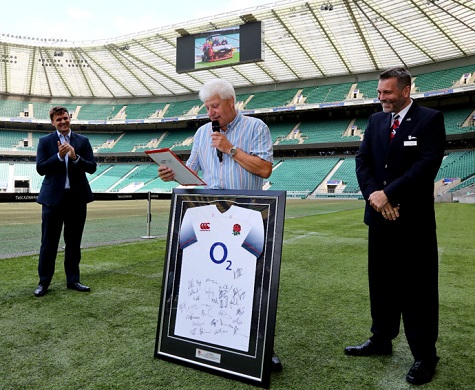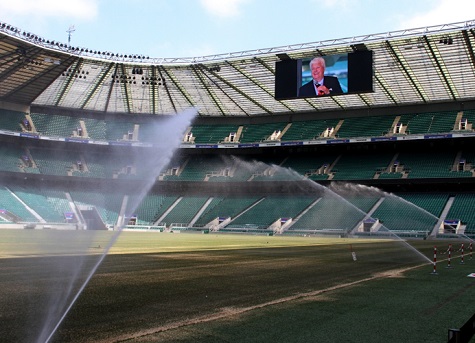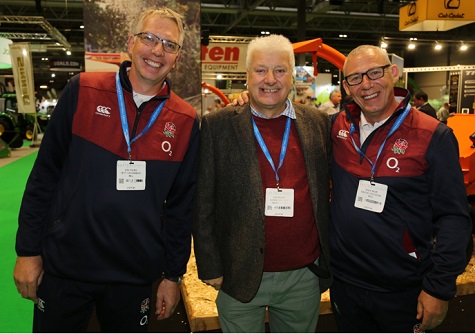TurfPro editor, Laurence Gale writes:
One of the biggest challenges our industry faces in the coming years will be inspiring the next generation of turf professionals to join our sector. We desperately need to start finding ways to encourage more people to come and work in this diverse, international industry.
To help start this process, I have asked a number of our leading professionals to write a piece about how they came to work in this industry and the opportunities it has given them.
Keith Kent, ex-Twickenham Head Groundsman

Tell us about yourself?
I left school in June 1970 and joined Leicester City FC as a trainee groundsman. I worked at LCFC for the next 17 years with my time split almost equally between the main ground at Filbert St and the training ground known as Belvoir Drive.
In 1987 I applied for a job via a PO box in London. It turned out to be Manchester United FC. I was successful in my application and started at Manchester on August Bank Holiday Monday 1987 as head groundsman of the stadium, Old Trafford, and the two training grounds. I oversaw the building of the new training ground at Carrington which opened in January 2000.
I spent 15 years working for MUFC before being approached by the RFU. I then took up the position of head groundsman at the home of England rugby, Twickenham stadium. I began my career here at Twickenham in September 2002. I spent 16 and half years at Twickenham before taking retirement at the end of June 2019.
I became an Ambassador for Linemark UK in the July 2019 and of late I have had the pleasure of working at Loughborough Grammar school to help an old friend. I have enjoyed seeing and taking part in another area of our industry.
Who or what inspired you to take up your career?
As a schoolboy growing up, I loved football and wanted to play in goal for my hometown club, Leicester City. I was not good enough, failing trials to become an apprentice. It was my mum who saw an advert in the Leicester Mercury for a trainee groundsman and she reasoned that if I was not good enough to play for them at least I could work for them?
I started my career that June and at first all that mattered was the games and the players. With age and experience I began to have more interest in the grass and my life grew accordingly.
Which individuals have inspired you or helped you develop professionally?

I was very young when I began and there were only four groundsmen at LCFC. There was a younger groundsman named Jim Henshaw, he was in his twenties and spoke to me about education and showed me some of the work that he had done at Brooksby College.
One of my first ever heroes was the late, great man Stan Gibson, head groundsman at Man City for many a year. I used to see his pitch on TV and admire it from afar. When I moved to Manchester, I made sure that I went to see him, and we became firm friends.
Another man who I looked up to was the late Peter Marron, head groundsman at Lancashire CCC. He taught me a lot about being independent and standing up for what you believed to be right.
My first ever consultant was Mr John Souter. A very knowable man who taught me a lot. He was the best man I had ever knew regarding sand and drainage. He was always there for me whenever I rang him, and he is a diamond of a man.
I met and formed a really good friendship with another legendary figure in our industry, the late great Eddie Seaward. I spent many an hour talking with him - well not really, just listening to this great man talk about what he intended to do, how he was going to do it and why! The roof over the courts at Wimbledon owe a great deal to the work carried out by Eddie. I was once on the same stage as him at BIGGA one year. He was the first speaker, and I was to follow him. How? I sat so engaged about the tale of the building of Number 1 Court that I had almost forgotten that I was the next speaker!
All of these people had an effect on me as a person and how I looked at the job.
What machinery or innovations have in your opinion helped drive our industry forward or helped make your job easier?
When I was a young man there was not a lot of aeration equipment around. We had one bit of kit at Filbert Street that scared me to death as it looked like it belonged in a torture chamber! All moving spikes on a barrel pulling the machine and me along!
The Verti-Drain was a game changer. A magnificent piece of equipment that changed my world. A brilliant piece of kit that does such a good job for the
groundsman. Used properly and in the right conditions it does nothing but good for your surface.
The Koro Field Topmaker was such a revelation when I first saw it! Such a simple idea but certainly one of the best. I used one every close season for many a year and in the hands of a good operator can take off just the right amount of foliage and root zone to within a millimetre. Almost everyone uses one now but back in the day it was such a sensation.
The SGL lighting rigs changed the world for me in 2003 when I first saw them. It took me two years to convince the board at Twickenham that they were the best investment they could make. Once they had seen what only two rigs could do, others followed. They now have 10 full size rigs now with perhaps 3 smaller ones as well.
All the bigger stadiums were struggling at that time with over play and pitches were having to be re- turfed with varying degrees of success. Once we had learnt how to harness the effect of these lights the whole industry adopted them with open arms.
Reinforced pitches have made such a difference. The Fibre Sand pitches are very good.
But in 2012 I had a Desso Grassmaster system installed by Mallinsons. That was the best pitch with the best system that I had ever worked with in my life!

Allied with all the equipment that I have named, aeration, Koro and lights, I felt confident that we at Twickenham could face any amount of play that they wanted to be played. Indeed at Twickenham in 2015 the grounds team was only 3 of us: myself, Ian Ayling my brilliant assistant and Andy Muir, our third member of staff. We did take on an extra man for around 8 weeks during the World Cup and build up and to this day Phil McLean is still one of the part time staff at the stadium.
Indeed when we hosted the Rugby World Cup in 2015 we played host to 10 games, 16 one and half hours training sessions and 3 kicking sessions inside of 6 weeks! In a wrap around stadium in the autumn and the pitch looked as good for the final game as it did for the opening game!
What concerns do you have for the future of our industry?
I fear that the younger generation is not being taught the basics of the job. Because of the advancement in our industry, reinforced pitches, better drainage systems and a better understanding of sand, we do not have to do some of the jobs that I did day in, day out.
Raking of goalmouths to a level that when rolled is perfectly flat. Divoting for hours on a pitch with very little drainage.
The councils do not have the training that they used to have for their parks department like they once did. My friend at Loughborough Grammar school was trained by Leicester City Council and has a vast knowledge of groundsmanship and the identification of plants, weeds as well as grasses.
We must never stop teaching the basics. Even in this computer age we still need to know how to read and write with a book and pen. And in this scientific age we still need to know the value of a hand fork and spade.
How do you think we can entice the next generation of industry professionals to come and work in this industry?
I think that to encourage youngsters into our industry we have to pay more in wages – plus offer training and an apprenticeship, either formal or other.
The leisure and sports industry have invested millions of pounds in parks, leisure centres and pitches. They need to be looked after by dedicated people who have an incentive to do well at what they are doing. Head groundsmen in professional sport have millions of pounds worth of players performing on their pitches. They are responsible for the well-being of those performers as well as the state of the surface and its presentation.
Surely this standard of work and pride in that work deserves to be better rewarded? The long hours, unsociable hours and weather conditions in which we all have to work deserve to be looked into with a favourable wage. Not a wage that is available for doing unskilled or semi-skilled work in the warm and dry!
How have recent events impacted on your job and how would you like to see the government support our industry?
2020 was devastating for our industry. The closing of sports clubs of every sport had such a bad effect on our grounds teams. With so many clubs and golf courses shut, people have lost their jobs and with little hope of a return unless the whole economy gets back on track and back on track very soon.
The knock-on effect of all of this is seems to be never ending? I myself lost my job as ambassador! My job was to meet and greet and shake hands and talk with people, that is not possible during a pandemic!
But much worse than that, people have been unable to play sport. If they are not playing no-one is marking out, preparing pitches for usage.
The real worry is that the local authorities must cut back on the things that our industry does best. Parks and playing fields, cricket squares and bowling greens that were hardly used, if at all, have been neglected and the councils have saved that money.
The easiest thing it seems to do is to cut back on the leisure industry. How many cricket squares, bowling greens and sports pitches are going to be lost forever after this is all over?
If we have learnt one thing in this pandemic, it is how much we all take the green around us for granted. Those parks that were put there by our forefathers are there for a reason. They are the lungs of our big cities and the escape of everyone. Whether you are out there jogging, walking your dog or playing either a team or individual sport these green spaces are of utmost importance.
They must be treated as such in the very near future. They do not look after themselves and would soon fall into disrepair if neglected any further.
We must invest in people. All people.
The government must invest in all green spaces and everyone who manages and looks after them so that everyone reaps the benefit of having those spaces.
Those parks and pitches are as equal in importance as any factory or office.
Green space and sport contributes to the well-being of the nation both physically and mentally. There must be investment as soon as we possibly can.